Beaudesert
is a small town in Queensland, Australia. Located about 40 miles
south of Brisbane, and slightly more than 500 miles north of Sydney,
the current population rests at around 5,400 people. And for those
that think of that population total as small… and, sure, depending
on the comparison, 5,400 isn’t likely to look that large… Beaudesert
serves as a central point for neighboring areas like Kooralbyn
and Tamborine. Very close to this town is some of the most beautiful
scenery you’ll ever find (such as Tamborine National Park). And
this is also where our story about Rick Price begins.
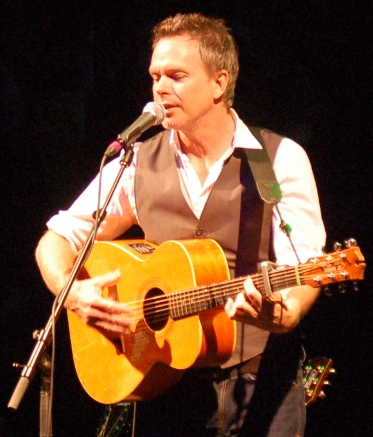
A
few decades ago, Beaudesert was the home base of Union Beau, a
family band consisting of members like Rick’s brother, sister,
aunts and uncles. They primarily played what Rick has described
many times as “country music mixed with psychedelic rock covers.”
Quite a combination. And yet, if you attend one of his performances…
even when playing an acoustic guitar during a solo effort… you
will see how much he draws from those early days. His music is
filled with emotion and experience (using family connections,
heartfelt lyrics, and a tremendously natural and comfortable stage
presence)… works perfectly presented by a man on his own with
a guitar (check out those classic, early country musicians)… and
has a connection with his audience that comes from a bit of familiarity
and alot of fun (“Takin’ It to the Streets” is tried and true
old war horse for Rick in concert, and his cover of “Walk Away
Renee” is one of his biggest hits).
By
the time he turned 18-years old, the big city had called, and
Rick was working as a professional musician out of Sydney. He
would spend a few years doing session work and playing a number
of instruments either with local bands or as a supporting player
on tours. Eventually, he reach a point in the mid to late 80’s
where he had begun singing more often, and the recognition he
gained as a vocalist (along with his beginning efforts as a songwriter)
allowed him the chance to initiate a solo career. In 1988 Rick
was asked to sing “Celebration of a Nation” in honor of Australia’s
bicentennial. And once he had an opportunity to appear at center
stage, Rick seized upon the moment.
“The
first few songs I wrote on my own were pretty terrible,” Rick
notes during our interview. But he wasn’t working completely alone,
and his songwriting skills were quick to improve. He teamed up
with fellow Australian Heather Field as well as the tandem of
Pam Reswick and Steve Werfel. By the time his first album, Heaven
Knows, was released in 1992, Rick had secured a place at
the forefront of the Australian music industry.
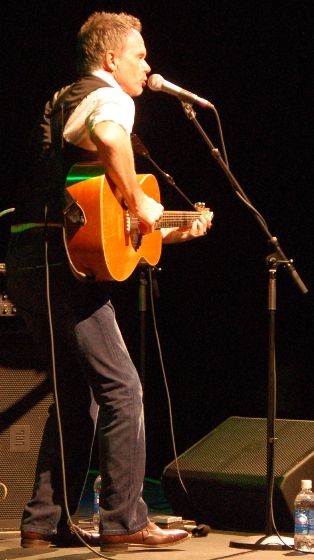
The
initial success came from the single for “Not a Day Goes By” (written
with Reswick and Werfel). It climbed as high as number 5 on the
Australian charts, and remained in the top 100 songs for approximately
5 months. The next single, “Heaven Knows” (which he wrote with
Field) was released about a month later and also cracked the top
10 while ultimately achieving platinum status. The third single
from the album, a cover of “Walk Away Renee,” also placed high
on the charts. When the album Heaven Knows was released
in June, it debuted at number 3. The accompanying tour was a success
on all levels.
Before
the end of 1992, Rick had been nominated for several industry
awards, including Best Australian Male Artist, Best Australian
New Talent, Best Australian Debut Single and Best Australian Debut
Album by the Australian Performing Rights Association (APRA).
“Heaven Knows” was honored with the award as the APRA Song of
the Year. “Walk Away Renee” won an Australian Music Award as the
most Popular Australian Song of the Year.
1993
and 1994 were filled with tours, interviews, and efforts that
would begin forming his second solo album. His work took him around
the globe, moving across Australia and throughout Southeast Asia
and Europe. His concerts drew sell out crowds, and in 1993 he
was honored with the Advance Australia Foundation award for his
efforts in contributing to the growth and enhancement of Australia
and its people. By late 1994, Rick was recording material for
his next release.
Tamborine
Mountain was released in mid-1995. In retrospect the album
isn’t quite a stunning departure from his earlier work, though
at the time his songwriting had definitely turned a corner. Heaven
Knows had been geared toward the mainstream market, with
a true pop feel to it. Fueled by the response and success of this
work, Rick felt confident about developing material that was even
more personal, focusing on relationships, family, love and life.
“River of Love,” “Bridge Building Man,” and “Love Never Dies”
are about as autobiographical as songwriting gets, and the move
from pop artist to storyteller was met critically and commercially
with positive reactions.
The
90’s contained several interesting moments and events beyond record
sales and awards. He participated in sold out tours with legendary
Australian artists Tommy Emmanuel and Jack Jones. As part of a
tribute to Peter Allen, he performed the classic “Tenterfield
Saddler” and received such an enthusiastic response that he was
asked to perform it live on the American program Good Morning
America. Ultimately, his interpretations of the song have
become another recognizable feature on Rick’s resume.
Rick
had established a fairly regular routine of traveling back and
forth to the United States when working on songwriting and recording.
In late 1997 he was busy preparing another album in Los Angeles
and Nashville. The result, Another Place, was released
in 1999.
2003
saw the delivery of an album called A Million Miles,
Rick once again changed things up a bit and presented something
new. The album was released on his record label, and featured
him performing every instrument played on it. A “Best of” album
was compiled and released in 2004, featuring a DVD segment and
live performances.
Continuing
to produce material while maintaining an Australian connection,
Rick worked on the soundtrack for the movie December Boys.
The film is an adaptation of a novel by Michael Noonan and is
set in Australia. Daniel Radcliffe, of Harry Potter fame, portrayed
one of the central characters. The opening number of the movie,
“Nobody Knows My Name” was written by Rick.
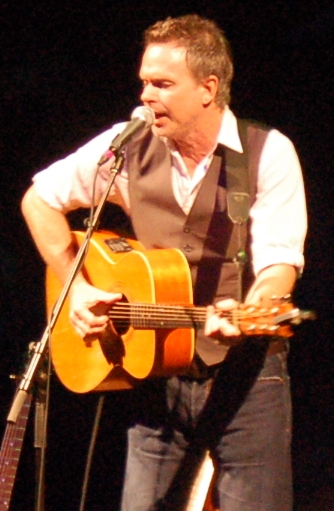
His
most recent album is titled Revisited, and in a way,
it is a gift to the demands of his dedicated followers. Here’s
what Rick says about the album on his web site: “Whenever I go
out and do an acoustic show, without fail, people will say to
me, ‘When are you going to make an acoustic record?’ So really,
this was borne out of requests from people asking me to do it.
That was the inspiration behind it, to give people a different
look at the songs because when you listen to the old recorded
versions, they were done 15 to 18 years ago, they are very different
to how I sing and perform them today.”
September
2009 finds Rick touring once again with Tommy Emmanuel, and preparing
to work on a new album.
~ ~
~ ~ ~
Rick
and I met in New Jersey on September 13th and conducted the interview
before a show in Massachusetts on September 17th.
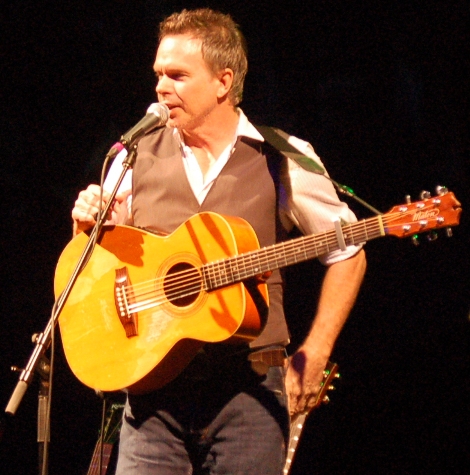
You
have an amazing ability to connect with an audience. It’s hard
to explain, and I don’t want this to sound wrong, because it seems
so basic. Some of it is the music you’re playing and some of it
is your singing, both of which are incredibly good. But the emotional
connection you create is amazing, from the passion you put into
each song to the way you speak between songs. It’s really quite
impressive.
Thank you for that.
It’s
not intentional. I just find what I do onstage to be a natural
way of performing. I do think it’s great when you can really connect
with an audience. And you’re right, it can be very powerful emotionally.
For
me, I guess it’s more of a personal thing. I believe it’s important
to try and make that connection with an audience, and it’s definitely
what I like to see when I go to a show. I enjoy telling stories,
and I like to preface the song to give a foundation to the audience.
Do
you find that your introductions to some of the songs give them
even more of a personal touch?
I
like to do it that way. It gives some insight into the subject.
Honestly though, often just listening to the lyrics of the song
would be enough. But I like to do it for myself.
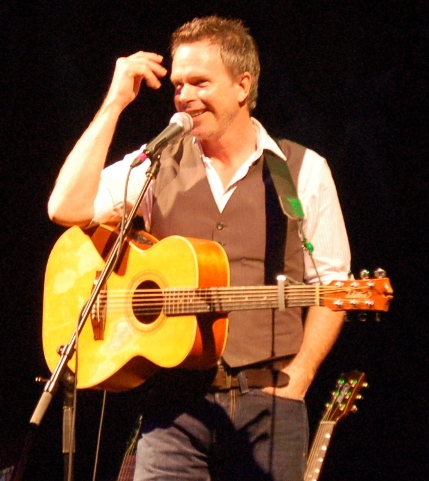
Considering
how personal some of your material is, I’m wondering how difficult
you find writing songs.
Very
difficult.
Singing
and playing is natural for me. It’s how I started…
Back
as far as Union Beau?
Sure,
even back then.
Playing
music is something I find comfortable to do. But songwriting,
that’s difficult. The first few songs I wrote on my own were pretty
terrible.
In
America, especially back when I first started writing, there was
a tendency to write pop songs with big hooks in them. That was
tough for me. I co-write material with others as much as possible.
I’ve written with Heather Field a lot, and I’ve learned so much
from her and others.
I
play often, and I practice a lot, and I enjoy all of it. I find
songwriting to be a very mysterious process though, even today.
Do
you find it easier to write music or lyrics, and do either seem
to be a more common starting point for you?
Music
first, but not always.
It’s
funny, because right now I have several songs written that are
just instrumental pieces. I don’t know if they’re instrumental
pieces or not though. You know what I mean? They’re completed
as far as the music, but I’m not sure they’re finished. They simply
don’t have any lyrics right now.
I
do find it’s important to have something to start with though,
some hook of a melody. Gives me something to hang my hat on and
I can write a lyric after that.
I
will say that for me, I think the music and how it feels is the
most important part of the song. No lyric, no matter how good
it is, is going to save it if the music is bad and it feels wrong.
(At
this point Rick picked up his guitar and started playing a few
chords, pointing out a couple of progressions as a potential starting
point and how it might flow into a strumming pattern or a melody.)
Do
you find yourself drawn to some chords more than others?
Absolutely.
And I try as hard as I can to avoid it.
People
are just naturally drawn to familiar things, and along that idea
I’m drawn to certain chords. I like them. I’m comfortable with
them.
I
once heard Bob Dylan say something I thought was very insightful
about songwriting. Basically he said that he had really just been
writing the same four songs over and over. (Laughs) Another person
I like, John Hiatt, used to say he would go into writing a song
looking for something new.
The
trick for me is to write on different instruments. That’s why
I learned how to play the piano. The piano is totally different.
By changing the instruments, I’m changing what’s familiar, what
I like, and it broadens the scope of what I’m working on.
With
all the traveling you do, especially while writing and recording,
do you find many differences between locations like Australia,
America and Europe?
Music
itself is universal. The differences I see are cultural.
Americans
tend to be much more curious. I get asked alot about rhythm and
strumming in the United States. I also find that there is a stronger
sense of camaraderie in American audiences. It’s more of a competitive
thing at times, but it’s a healthy competition, where the audiences
seem to be pulling for you to succeed.
In
Europe things tend to be much more passionate and raw.
Since
you mentioned strumming, I asked you this when we first met. I’ve
had troubles playing with a pick. Sounds right one moment and
then completely wrong the next. Watching your set, with the differences
you were getting, I couldn’t believe you weren’t using a pick
at all.
That’s
right. I don’t use one when I’m performing.
I
do use picks when I’m recording. I’ll also use them if I’m playing
a 12-string guitar or a mandolin. There are times when I need
that brighter, cleaner sound from a pick.
But
with a regular guitar I prefer to play without one. I can use
my thumbnail to get the effects I want, whether muffling some
of the playing or trying to keep it open and bright. It took me
a while to get used to playing that way, and to get what I wanted.
Now I just find it smoother and softer, and much more natural.
It
depends on the guitarist and what they’re comfortable with. A
little while ago I was watching Shawn Colvin play and I was sure
she was playing without a pick. Later I found out she was using
one.
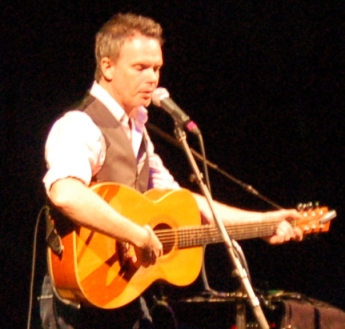
Matons.
Between you and Tommy… I have to ask about Matons. I love everything
I hear about them but can’t find them nearby to try one.
What
do you play now?
My
guitar teacher swears by Taylors. He introduced my stepson and
I to them, and we both really love them. I also have an entry-level
Guild and my stepson is looking at some Martins.
Taylor
makes a really great sounding guitar. I like Martins too.
(Picks
up his guitar.)
I
got this one about 20 years ago. I got an endorsement with them
while making records, and they’re just great guitars for live
performances.
This
one is (laughs while looking at the label inside)… I’ve had it
forever and I still have to check the model number. It’s an EBG808.
Tommy was playing one years ago and I loved the way it sounded.
So he called them up and they sent me this one. Stock standard,
right out of the box. It’s got a small body and a great neck.
The really outstanding thing about them is the pickup.
For
me, this feels right. And if the guitar doesn’t feel right, toss
it and get another one.
You
mentioned how long you’ve known Tommy and been working with him.
My wife and our friends told me I had to ask if you had any plans
to record with him, because the two of you are just fantastic
together during the show.
(Laughs)
Well thank you. And thank them. We might at some time. You never
know. We did record some work back on an album of Tommy’s called
Collaboration.
The
thing about playing with Tommy is that he’s such a strong player
he can really carry the song. I just try to sit back, feel the
pulse of what we’re doing, and then work on tucking in my stuff
beside what he’s playing.
The
tour with Tommy will wind down in a few weeks. Your history seems
to suggest you move back and forth between the United States and
Australia while touring and recording. What are your plans for
your next efforts.
I
have always traveled while working on projects. Heaven Knows,
the first album, was recorded in the United States. When it took
off in Australia I stayed there for a while.
I
came back this last time in January and I plan on staying in America
for a couple of years. I am planning to start recording my next
album soon, and I intend to play all the instruments on it myself.
I
know you have to get ready for the show. Thanks for your time.
Thank
you. I enjoyed chatting with you.
~ ~
~ ~ ~
I
want to take a moment to express my thanks, appreciation, and
gratitude to two specific people.
First…
to Gina Mendello. When I approached her about interviewing Rick
she was incredibly understanding and cooperative in making arrangements
with me. There is no way this interview would have taken place
without her patience and assistance. I am quite grateful for her
time and consideration.
And
second… of course… to Rick. I have been fortunate to encounter
some incredible people through the interviews I’ve conducted.
Rick is no exception to this. He was thoughtful and attentive
while answering my questions, an amazing host backstage during
the interview, and he possesses a wonderfully personable nature
that is immediately comforting and friendly.
These are two people from a hard-working group that is very passionate
about what they do… and very good at it as well. Kind words alone
are not enough to express my appreciation and gratitude. I can
honestly say that I sincerely hope my future finds a time when
both Rick and Gina may be involved with me on another project.
~ ~
~ ~ ~
If
you appreciate good music... honest, pure songs with thoughtful
lyrics and great guitar playing... then check out Revisited
by Rick Price. Featuring his tremendous vocal abilities, the album
does a wonderful job of bringing some of his best songs together
with new presentations. (Trust me, you’ll
find yourself listening to it over and over again.)
If
you’d like to find out more about Rick, you can also visit his
personal web site...
Rick
Price
Rick
Price at iTunes